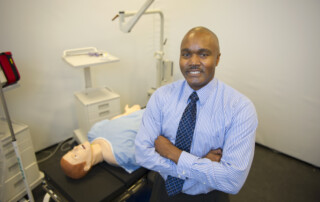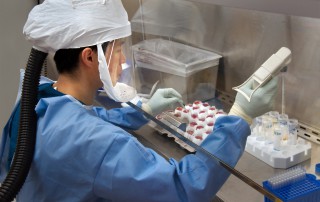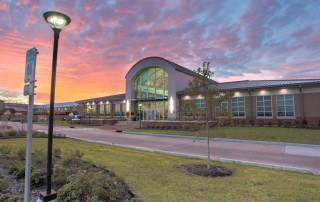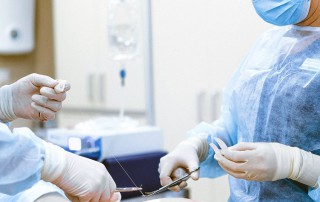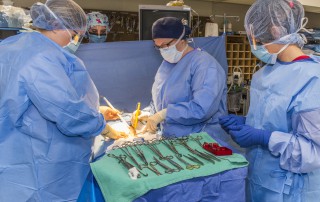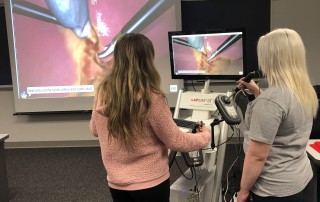Congrats to Initially Accredited Programs
ARC/STSA would like to congratulate the surgical technology program at East Mississippi Community College in Mayhew, MS, for achieving initial accreditation. Please join us in celebrating their hard work and hear from Surgical Technology Program Director Alicia King, BS, CSFA, CST, on what this means for their students.
A Promising Year Ahead: Updates from ARC/STSA in 2021
As we settle into a new year, I expect you are all off to an incredibly busy 2021! I hope you have an escape mechanism in place, something you can focus on that relaxes and rejuvenates you so you can better handle your incredibly busy schedules. My mechanism is music. I have been thinking a lot lately about the following lyric…
A Free Resource to Give Students a Leg Up: The Da Vinci Certification
The Da Vinci Surgical System offers an advanced set of instruments for surgeons to use in performing robotic-assisted minimally invasive surgery. This cutting-edge technology is already making its way into operating rooms (ORs) across the country, which affects the job of the surgical technologist. To ensure students are provided with greater marketability when they enter the workforce, the surgical technology program at Reading Hospital has incorporated the Da Vinci Surgical Certification program into its coursework. ARC/STSA spoke to Gwendolynn Jackson, AAS, RN, CST, surgical technology faculty at Reading Hospital, to learn more about the certification.
When Students Learn From Each Other, Programs Win
At Pikes Peak Community College in Colorado Springs, CO, David Provost, MA, BS, CST, surgical technology department chair and program director, has developed a mentorship program where his first cohort of students, who are in clinicals, mentor the incoming cohort. ARC/STSA spoke to Provost about his inspiration for the program and how it has benefitted the department. Plus, hear from mentors and mentees about how the program helped boost their confidence.
How One Surgical Assisting Program Uses Virtual Simulation to Prepare Master’s Students for Clinicals
Since 2013, the master of surgical assisting program at Eastern Virginia Medical School has offered the minimally invasive surgery lecture and skills lab. This course is designed to give the surgical assistant student a broad look into minimally invasive surgery while introducing the techniques involved. The content includes numerous sub-specialties and how minimally invasive techniques are utilized, the history of these techniques, as well as hands-on learning to help facilitate the student’s learning curve once they are in their clinical year. This course is aligned with the guidelines suggested by the Association of Surgical Assistants for minimally invasive and robotic surgery techniques.
Educators Share Their Experience With SynDaver
There are many ways to prepare students for their clinical experience. Some programs have started using SynDaver, a detailed synthetic cadaver that gives students the ability to participate in mock surgeries. ARC/STSA reached out to Stephanie Kanupp, AAS, CST, and Michelle Diaz, CST, to talk about how their programs use SynDaver and their thoughts on the investment.
Congrats to Programs Earning Continuing and Initial Accreditation
ARC/STSA would like to congratulate the surgical technology and surgical assisting programs that have recently received grants of initial and continuing accreditation. Please join us in acknowledging the dedication and hard work it took for these programs to reach these critical milestones.
Message from the Executive Director: Hello, 2021!
Ron Kruzel, MA, CAE, CST From Ron Kruzel, MA, CAE, CST, ARC/STSA Executive Director “You say goodbye, and I say hello…” —Paul McCartney GOODBYE 2020! As 2020 draws to a close, what is there left to say? We have tried to make sense of it all, memes have flowed freely and we are all exhausted. 2020 really [...]
How Your Programs Are Giving Back This Year
In a year full of challenges, being able to give back to the community feels even more meaningful this holiday season. We are so proud to share details of how some of our educators and students are reaching out to safely support their communities. School: Reading Hospital School of Health Sciences, Reading, PAShared By: Davina Foster, BSN, CST, [...]
Tips for Preparing for a Virtual Site Visit
The world has gone virtual during the COVID-19 pandemic, and site visits are no exception. Jennifer Lloyd, BS, CST/SFA, director of surgical technology at Trine University, Fort Wayne, IN, shares her experience and tips for preparing for her program’s very first virtual site visit.
Keeping Students Engaged Over a Long Break
With winter break around the corner, it’s important to give students a sense of continuity and ensure they retain the information they have learned. Connie Bell, CST, FAST, shares tips for supporting students as they return to clinicals after an extended break. Plus, Theresa Sorgen-Burleson, MBA, CST, discusses how her program at the University of St. Francis keeps students engaged over longer summer breaks through a retest program.
Simulation Spotlight: An Instructor’s Experience with PeriopSim
Advances in technology have made surgical simulation a powerful teaching tool, and there are many options that can apply to surgical technology. Terry Herring, surgical technology division chair at Fayetteville Community College, spoke to Amy Broussard, program director and lead instructor at SOWELA Technical Community College, about one such simulation technology, PeriopSim.
2021 Student and Educator Scholarships Available — Apply by Feb. 19
Applications are now open for the ARC/STSA 2021 Student and Chris Keegan Memorial Educator Scholarships! Learn more about the process and requirements on the ARC/STSA website’s scholarship page. All completed applications must be received by Friday, February 19, 2021.
Congrats to Programs Earning Continuing and Initial Accreditation
ARC/STSA would like to congratulate the following surgical technology and surgical assisting programs for receiving grants of initial and continuing accreditation. Please join us in acknowledging the dedication and hard work it took for these programs to reach these critical milestones.
Message From the Executive Director: A Positive Outlook for Fall
With the onset of fall 2020, our surgical technology and surgical assisting program communities continue to adjust to the reality of providing education in the midst of a worldwide pandemic. Didactic, lab and clinical coursework has begun with the fall term, albeit much differently than the fall of 2019. What has not changed are the students entering their programs, enthusiastic and idealistic, and wanting to make a difference in a healthcare environment unlike any other. They are excited to be starting this new chapter in their lives. The fall semester was my favorite when I was in the classroom — it gave me the opportunity to shape future surgical technologists early in their education and to embrace their enthusiasm as if it were my own.
Solutions for Socially Distant Labs and Tips for PPE
In light of the need for social distancing, ARC/STSA asked instructors to share their solutions and protocols for lab rotations and other activities that usually involve hands-on instruction. We also asked for suggestions on how to obtain protective personal equipment (PPE) for students when it is not made available at clinical sites. What follows is a compilation of ideas and tips we received.
Role Reversal: Admissions Reps Become Students for a Day
Several years ago, enrollment for the surgical technology program was down at the University of St. Francis (USF). In need of new avenues to recruit students, Surgical Technology Program Director Theresa Sorgen-Burleson, MBA, CST, turned to her admissions team. But rather than ask to increase their efforts, she sought to help them understand the profession.
The Value of Virtual Simulation: Drawing From 20 Years of Experience
In 1992, Becky Larson was a young mother of three, looking for a job that allowed her to work remotely. Because options for virtual work were limited at the time, she found herself in the world of medical transcription, which ultimately led her to a variety of roles in medical simulation. She quickly became passionate about the work and the technology’s ability to allow students to practice their skills in a safe environment.
Get to Know Our Scholarship Recipients
Earlier this year, ARC/STSA was pleased to announce its 12 scholarship recipients, including 10 students and two educators. Get to know a few of these individuals and what drives their passion for the profession in this roundup with images and quotes.
An Update from the ARC/STSA Executive Director
Welcome to the ARC/STSA July/August eNewsletter. We are eight months into 2020, where addressing extraordinary challenges and making difficult decisions happen almost daily. None of us signed on for this, yet here we are. Along with the challenges, there are shining examples of caring and a profound sense of community among our educators. We are clearly better together. With so much happening, my update will provide a brief summation on a number of pertinent topics related to activities at the ARC/STSA.
Transitioning From a Diploma to an Associate Degree Program
For many years, there has been discussion about an associate degree in surgical technology as the preferred entry-level model. Once stronger language around the subject became more common — words like “recommendation” and “proposed requirement” — we decided to get busy and make the Associate Degree in Surgical Technology (AAS.SUR) a reality for York Technical College (YTC) in Rock Hill, South Carolina. It has been a long process but we are happy to report our first cohort for the AAS.SUR will begin their journey this month on August 19, 2020.
Conducting a Virtual Orientation for New Students
This fall, many cohorts will find themselves not only starting a new program, but also becoming immersed in a virtual environment — some even for the first time. How can educators and faculty help set up students for success from the start in this new reality? ARC/STSA spoke with Heather Phillips, coordinator of student services at Reading Hospital School of Health Sciences, on how their program is helping new students feel welcomed in this challenging time.
Tips for Hosting Effective Virtual PAC Meetings
The COVID pandemic has forced us to rethink how we keep our programs moving forward during such a challenging time. Our lecture content, lab competencies and clinical hours tend to be our highest priority; however, there are many other moving parts to a successful program, including maintaining a strong Program Advisory Committee (PAC).
Announcing the 2020 ARC/STSA Scholarship Recipients
The ARC/STSA is proud to announce the recipients of the 2020 scholarship awards. This year, 10 students were awarded a total of $5,000 in combined scholarships. In addition, this year the ARC/STSA was so inspired by the educator applicants that we awarded the Chris Keegan Memorial Educator Scholarship to two surgical technology educators, both of whom are pursuing doctoral degrees! Read more about these accomplished individuals.
Chris Bednarski Joins the ARC/STSA Team
The ARC/STSA is pleased to welcome Chris Bednarski, BBA, as our new Administrative Assistant. In this role, Bednarski serves as an initial point of contact for our educators, answering inquiries regarding accreditation and submission requirements. He is responsible for acknowledging submissions related to programmatic changes and following up on inquiries from our programs, to assure that they are reviewed and receive appropriate guidance from staff.

Surgical Technology Sequencing for Student Success
By Melanie Graves, MBA, CST
In surgery, precision isn’t optional — it’s vital. Every member of the operating room team must be efficient, alert and disciplined. Surgical technologists play a key role in this critical environment, and the way they are trained matters. Our program uses a step-by-step, sequential training approach that gives students the knowledge, skills and confidence to succeed — not just in class, but in the operating room as well. When the teaching method is built around aseptic technique, timely clinical placements and well-integrated observation experiences, it doesn’t just build better techs — it protects patients.
First Semester: Building a Strong Foundation
In our surgical technology program, the first semester is carefully structured to focus on foundational skills, without introducing specialty cases. Students begin by learning the core principles of asepsis — the backbone of surgical safety. At this stage, the curriculum follows a strict sequence. Students progress from understanding what a preference card is to learning how to pull a case, mastering the names of instruments, opening a surgical case, perfecting how to scrub, gown and glove, and preparing a basic exploratory laparotomy.
This approach ensures that students understand not only what to do but why it matters. Aseptic practices aren’t just skills to memorize — they are life-saving measures. Teaching them early and thoroughly helps students develop discipline, attention to detail, and the mindset needed for surgical teamwork.
Observation Clinicals: Bridging the Gap
While mastering these foundational steps, students also attend a weekly observation clinical rotation. These observation days are intentionally placed during the first semester — after core concepts are taught but before hands-on clinicals begin. This timing allows students to see the surgical environment in action, reinforcing what they’re learning in the classroom and lab.
During these observations, students watch surgical teams perform live procedures. They learn how sterile technique is maintained under pressure, how team members communicate, and how the flow of a surgery unfolds in real time. Just as important, they see where to stand, learn when to speak and how to respect and preserve the sterile field.
This early exposure shapes their understanding of the OR, ignites curiosity and builds motivation. When they return to the lab, they bring better questions and sharper focus, connecting classroom knowledge to real-world practice.
Clinical Readiness Exam: The Gatekeeper to Clinical Practice
Before students can begin their hands-on clinical rotations, they must pass a comprehensive final hands-on skills assessment called the Clinical Readiness Exam. This exam is designed to ensure that students have mastered essential competencies: setting up sterile fields, identifying instruments, maintaining asepsis, and demonstrating confidence in the basic sequence of surgical case preparation.
This high standard protects both students and patients. Clinical sites expect students to be capable, prepared and safe. Requiring mastery before placement ensures that students enter the OR as contributors, not as liabilities.
Specialty Cases Come After the Basics
Only after passing the Clinical Readiness Exam do students transition into their clinical rotations, where the focus shifts to specialty surgeries. This timing is intentional. By this stage, students are no longer in the learning phase of how to handle instruments or keep a sterile field — they’ve already mastered those skills. Now, they can focus on learning the nuances of various specialties such as orthopedics, neurology, gynecology and more.
This sequence allows students to absorb complex information in context. They’re not distracted by basic technique or overwhelmed by unfamiliar environments. Instead, they’re ready to adapt, assist and grow into the role of surgical technologist with confidence and clarity.
Structured Training, Stronger Technologists
When surgical technology is taught in a well-ordered, sequential format — grounded in aseptic principles, supported by observation clinicals and timed appropriately for hands-on practice — the results speak for themselves. Students gain more than technical ability. They learn to think critically, act decisively and uphold the safety of the surgical field with integrity.
They understand the “why” behind every step, understand the connection to the “how”, and they’re equipped to support the surgical team from day one. From their first semester to their final rotation, they develop into professionals who are prepared, capable and committed to patient care.
Conclusion
Surgical technology is a discipline where preparation, precision and patient protection intersect. Teaching it in sequential order — with aseptic technique as the foundation, early observation as reinforcement, and clinical placements timed after demonstrated readiness — transforms students into professionals. In our program, students learn the basics first, master their skills in the lab, and only then enter the clinical field to explore specialty surgeries. This structure produces not only skilled technologists but also thoughtful, reliable team members who understand their vital role in safeguarding patient lives.
Melanie Graves, MBA, CST, is the Program Director and Department Chair of Surgical Technology at Austin Community College in Austin, TX. She graduated from the same program in December 2015 and scrubbed in Austin and Cedar Park until 2022. In January of 2020, she began teaching for ACC’s Surgical Technology program alongside those who taught her, and she moved into her role as the Program Director in August of 2023.





